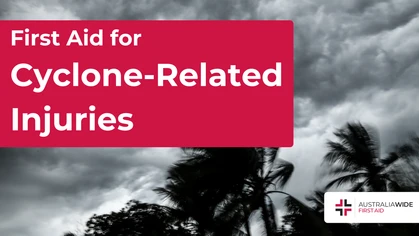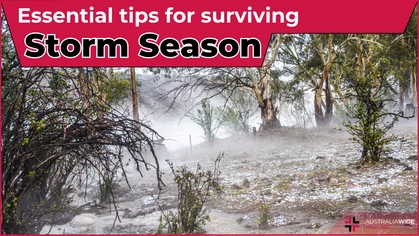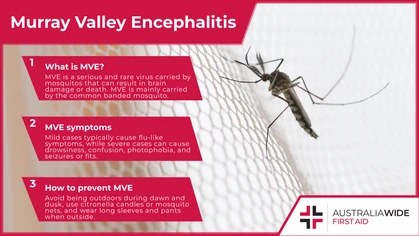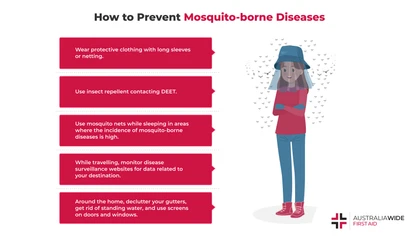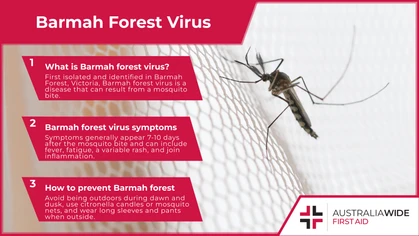Travel First Aid: Gastroenteritis

Seasonal Concerns
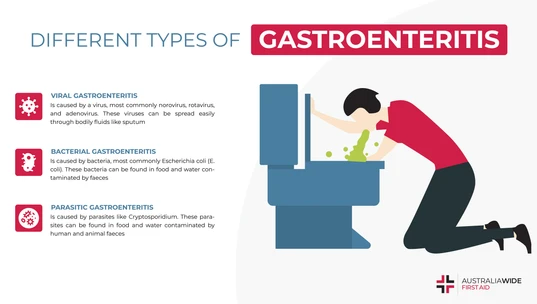
Gastroenteritis is an inflammatory infection in the gut in response to bacteria, viruses, and parasites in food or water. In this article, we take a look at how to reduce your risk of gastroenteritis while travelling.
The summer season, for many Australians, is the perfect time to explore nearby oases and adventurous locations. But travel increases exposure to viruses, bacteria, and parasites that can cause gastroenteritis. Gastroenteritis is an infection that leads to gut inflammation and symptoms like nausea, vomiting, and diarrhoea. Gastroenteritis can occur anywhere, not only when travelling, and is commonly experienced by travellers in areas with fewer hygiene standards and public health controls. Some destinations will have a greater risk of acquiring gastroenteritis than others. It is impossible to pinpoint where you will encounter gastroenteritis-causing bacteria, but countries such as Bali in Indonesia have higher rates of gastroenteritis experienced by travellers. While gastroenteritis is usually treated adequately with hydration and rest, it can be particularly menacing for the immunocompromised, the very young, and the very old populations. Being prepared for a gastrointestinal illness and knowing how to treat it can help to reduce its severity and prevent serious illness.What is Gastroenteritis?
Gastroenteritis refers to the inflammation of the gastrointestinal system, usually caused by a virus, bacteria, or parasite. The common name for gastroenteritis is “the stomach flu,” although the influenza virus is not responsible for causing this illness. Symptoms are usually short-lived, but it is highly infectious and can be severe or prolonged in some cases.
Gastroenteritis is marked by abdominal cramping, pain, diarrhoea, and vomiting.
Symptoms
Symptoms originate in the gastrointestinal system. The offending virus, bacteria, or parasite causes tissue damage in the gastrointestinal system and subsequent inflammatory response. Each person will experience symptoms to varying degrees and may not experience every symptom listed below. The most common symptoms associated with gastroenteritis include the following:- Nausea
- Vomiting
- Abdominal pain
- Abdominal cramping
- Diarrhoea
- Fever
- Loss of appetite
- Body aches
- Light-headedness
- Low urine output
- Dark-coloured urine
- Blood in stool
- Lethargy
Causes
Viral gastroenteritis, caused by exposure to a virus, is very easily passed from person to person. Common viruses include norovirus, rotavirus, and adenovirus. Most viruses causing gastroenteritis are spread through contact with bodily fluids such as sputum and stool. These bacteria may be present on the hands in large quantities after sneezing or using the restroom. Bacterial gastroenteritis is caused by bacteria, most commonly Escherichia coli (or E. coli), Campylobacter, Salmonellosis, and Shigellosis. These bacteria can be found in faeces and are commonly encountered by travellers in contaminated food and water. Parasitic gastroenteritis is caused by parasites like Giardiasis and Cryptosporidium. These parasites are found in human and animal faeces and can be spread via contact with contaminated food and water. Humans can spread parasites by not washing their hands after using the restroom.When to Visit a Doctor
Symptoms associated with gastroenteritis usually last 1-3 days but can persist for a week or longer. If your symptoms are severe in the first three days or prolonged, you can become severely dehydrated. The inability to maintain an appropriate intake of fluids can further exacerbate this. You should visit a doctor if you are experiencing the following:- Unresolving fever
- Dark-coloured urine
- Lethargy
- Faintness
- Appear excessively dehydrated (sunken eyes, tenting skin, dry mouth, and dry lips)
- Blood in the stool
- Low urine output
Treatment
The best treatment for gastroenteritis is rest and fluids. The body needs time to repair the tissue damage in the gastrointestinal system. Drink fluids in small quantities to avoid irritating the gastric lining. Supplement fluids with electrolytes like sodium and potassium. These electrolytes are commonly found in electrolyte replacement drinks. Be careful not to indulge in too many sugary sports drinks and fruit juices, as they can exacerbate symptoms. If you struggle to consume fluids, try ice chips or popsicles made from electrolyte replacement drinks. Food intake remains essential as it will provide the energy necessary to cope with gastroenteritis. Eating foods that are easy to digest and non-irritating to the gastric lining may help reduce symptoms. Easy-to-digest foods include:- Bananas
- Chicken
- Rice
- Toast
- Broth or soup
- Applesauce
- Eggs
- Melon
- Avocado
- Carrots
- Dairy
- Alcohol
- Hot/Spicy foods
- Caffeine
- Fried food
Prevention
The most important way to reduce the transmission of microbes and illness is to wash your hands. Wash your hands before eating, after using the restroom, or when handling food. Rub your hands together briskly to create friction to help remove bacteria, viruses, and parasites from the hands. Water does not need to be scalding. The rotavirus vaccine is available in many countries and is commonly administered to children. It effectively prevents and reduces the severity of rotavirus infection in children for up to five years after administration. Reduce transmission to others by staying home at least 48 hours after the last episode of symptoms. Clean high-touch surfaces regularly, like countertops, toilets, door handles, kitchen appliances, and changing tables. Use anti-bacterial agents or soap and water as you are able. Store food at appropriate temperatures and avoid cooling, then reheating multiple times. Take caution when consuming food and fluids from unknown sources like local markets, as these spaces may not adhere to sanitation guidelines.Conclusion
Gastroenteritis is a common illness, especially for travellers. It is generally mild and does not have lasting effects, but it can be dangerous for immunocompromised, very young, and very old populations. It can be treated at home except in severe cases or when present in fragile populations and usually resolves in 1-3 days. If you enjoyed this article and want to learn more about first aid, check out the below resources from the Australia Wide article library. Taking a first aid course can help prepare you in case of illness or emergency.- First Aid for Dehydration - First Aid Course (australiawidefirstaid.com.au)
- First Aid When Caring for the Elderly - First Aid Course (australiawidefirstaid.com.au)
- Why You Need To Know First Aid This Summer - First Aid Course (australiawidefirstaid.com.au)
Originally published at
https://www.australiawidefirstaid.com.au/resources/gastroenteritis
as part of the Australia Wide First Aid Articles Library
